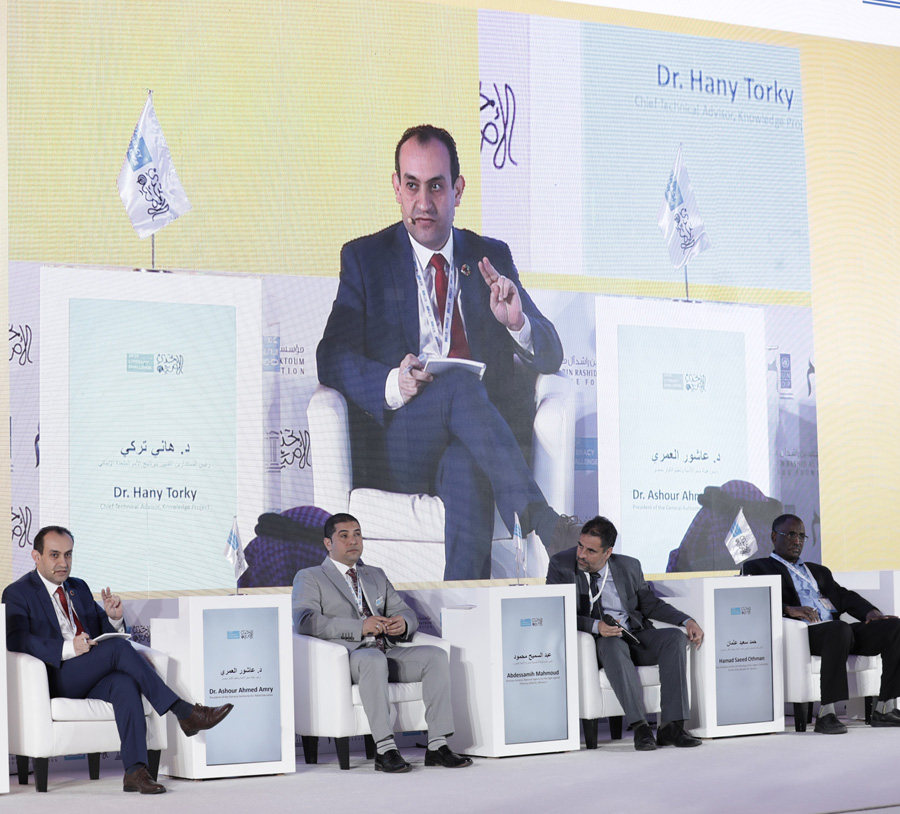Literacy Challenge Forum 2020 Explores Examples and Experiences from Egypt, Sudan, and Morocco
- The Forum is organised by the Mohammed bin Rashid Al Maktoum Knowledge Foundation, in collaboration with the UNDP and UNESCO.
‘The State of Adult Learning in the Arab Region’ was the topic of discussion at a panel discussion on day one of the Literacy Challenge Forum 2020, where experts explored the major challenges facing Arab countries in terms of literacy, as well as lessons learned from Arab experiences.
Moderated by Dr Hany Torky, Chief Technical Advisor of the Knowledge Project, the session brought together Dr Ashour Ahmed Amry, President of the General Authority for Adult Education in Egypt, Abdessamih Mahmoud, Director General of the National Agency for the Fight Against Illiteracy (ANLCA) in Morocco, and Muhamad Hamad, Vice President of the 5th Meeting of the Higher Committee for the Arab Decade for Literacy in Sudan.
“If education is meant to prepare people for life, then academic activities must stem from life, and as life is constantly evolving – particularly in light of the Fourth Industrial Revolution - it has become imperative for individuals to develop digital life skills,” said Dr Amry, outlining five goals for adult education, namely, ensuring access to technical and vocational education and higher education; providing individuals with the skills they need to find decent employment; eliminating gender disparities in education; promoting literacy among youth and adults; and finally, ensuring gender equality, peace, and global citizenship.
For his part, Muhamad Hamad showcased Sudan’s ongoing efforts to develop trailblazing academic programmes since the 1990s, most notable among them being the drive to use technology in facing illiteracy, through e-learning programmes.
“By applying this method, Sudan sought to equip the target audience with basic knowledge, and provide them with skills and values that help them in their lives,” Hamad added. “We also strived to strengthen our portfolio of national and global partnerships that seek to support and develop the federal state’s capacities and success, in addition to developing targeted communities, and measuring the efficiency of using smart devices in education.”
Hamad shed light on prominent challenges and opportunities, noting that the challenges lie in the number of illiterate people in the 15-45 age group, which has exceeded five million people – most of whom are women, accounting for 35% of the population. Moreover, more than 2.5 million (or 30%) school-aged children do not attend school. The most prominent opportunities, meanwhile, consisted of the several successful experiences and models Sudan has implemented, which are playing an immense role in confronting illiteracy in the country.
Meanwhile, Abdessamih Mahmoud discussed the tasks of the National Agency for the Fight Against Illiteracy in Morocco, which include proposing measures to improve the system to combat illiteracy, and coordinating with various stakeholders active in the efforts to combat illiteracy. The Agency aims to reduce the country’s illiteracy rate to 20% in 2021 and 10% in 2026, Mahmoud revealed, noting that the number of beneficiaries from the Agency’s literacy programmes reached 1,131,703 beneficiaries in 2019, up by 8% compared to the 1,045,974 beneficiaries registered in 2018. In total, more than 4.5 million people have benefited from literacy programmes since the Agency’s establishment in 2013.








